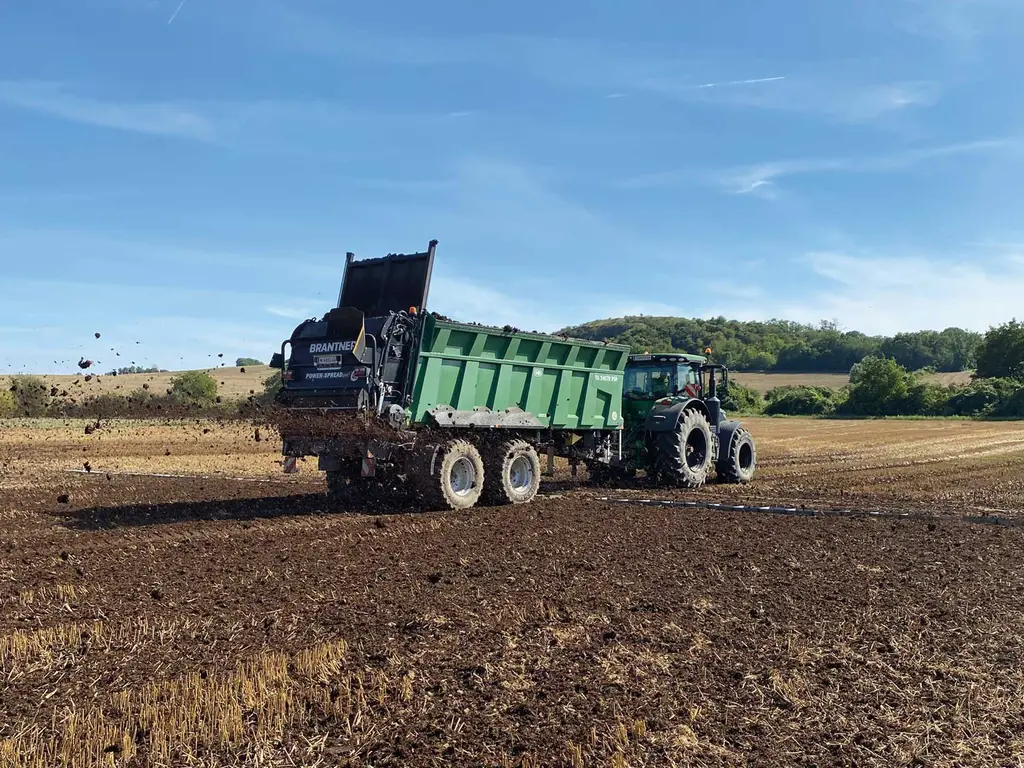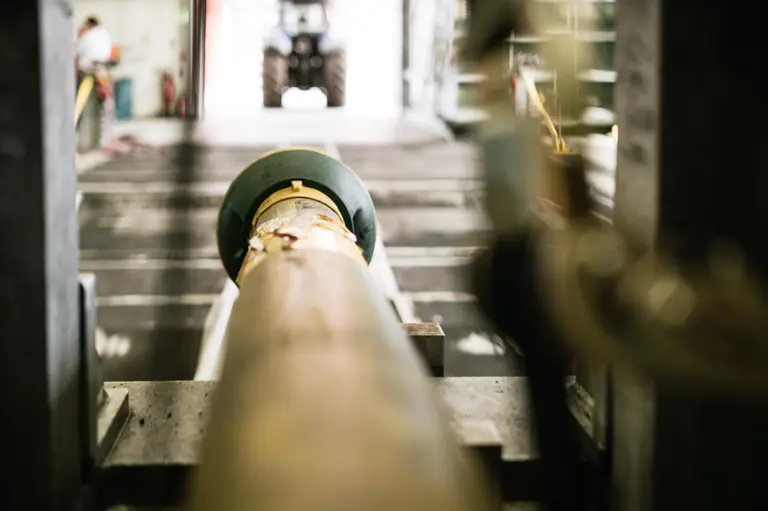Download print version
Test report 7230
The approval
A test mark “DLG-APPROVED for individual criteria” is awarded for agricultural products which have successfully fulfilled a scope-reduced usability testing conducted by DLG according to independent and recognized evaluation criteria. The test is intended to highlight particular innovations and key criteria of the test object. The test may contain criteria from the DLG test scope for overall tests, or focus on other value-determining characteristics and properties of the test subject. The minimum requirements, test conditions and procedures as well as the evaluation bases of the test results will be specified in consultation with an expert group of DLG. They correspond to the recognized rules of technology, as well as scientific and agricultural knowledge and requirements. The successful testing is concluded with the publication of a test report, as well as the awarding of the test mark which is valid for five years from the date of awarding.
The ammonia resistance test was performed as a laboratory test according to the patented DLG test standard. This test is intended to determine the suitability of equipment for animal living areas to withstand the impacts of animal environments. The cleaning distance test assesses the suitability for cleaning animal living areas.
Other critera were not tested.
Assessment – brief summary
The LED Light “771-Farmer” from IBV Hungária has successfully completed the DLG test for ammonia resistance and cleaning distance. According to this result, it can be assumed that these luminaires are resistant to the typical environmental conditions of animal living areas and that no accelerated reduction of the product lifetime will occur. In addition, LED Light “Farmer-771“ was operated actively in the chamber for the entirety of the test. No product damage was observed here.
Furthermore, the cleaning distance is regarded as suitable for the cleaning of animal houses.
Table 1: Assessment in brief
| DLG QUALITY PROFILE | Evaluation* |
|---|---|
| Ammonia resistance | ■■■■■ |
| Preservation of the luminous flux | ■■■■■ |
| Cleaning distance | ■■■■■ |
* The DLG test framework provides the following options in its evaluation schemes:
■ ■ ■ or better = meets, exceeds or clearly exceeds the specified DLG standard, ■ ■ = meets the legal requirements for marketability, ■ = failed
The product
Description and technical data
The LED Light “771-Farmer” tested is suitable for use in animal housings, in agricultural farm buidings and for unprotected outdoor use.
Table 2: Technical data (according to manufacturer)
| LED Light 771-Farmer | |
|---|---|
| Electrical connection | |
| Voltage | 220 - 240V AC |
| Frequency | 50 Hz |
| Performance | 43 W |
| Dimension and weight | |
| Length x Width x Height | 1,577 mm x 112 mm x 99 mm |
| Weight | 2.2 kg |
| Additional technical data | |
| Number of LED modules | 1* |
| Housing material | glass fibre reinforced polyester (GRP) |
| Cover | Opal Acrylic PMMA |
| Material of brackets | stainless steel |
| Protection rating | IP 66 |
| Colour temperature | 5,000 K (optional 4,000 K) |
| Dimmable | no (DALI optional) |
| Beam angle | 120° |
| Rated luminous flux | 6,600 lm |
| Luminous efficacy | 154 lm/W |
* Zhaga standard, replaceable, including connecto
The method
Resistance to ammonia
The ammonia resistance of the LED light “771-Farmer” was determined by a laboratory test with two luminaires according to the patented DLG test standard for agricultural use. The laboratory test is designed to replicate the conditions of a usage period of about 10 years exposure to animal living areas.
The test was carried out in a climate chamber under the following climate conditions:
| Test duration | 1500 h |
| Air temperature | 70 °C |
| Relative humidity | 70 % |
| Ammonia concentration | 750 ppm |
For assessing the ammonia resistance, each luminaire was examined visually, gravimetrically and the plastic parts additionally through measurement of the hardness (Shore D) before and after the climate testing.
The luminaires have additionally been following a cycle of operation predefined by DLG (3 hours on, 1 hour off) in order to evaluate any thermal impacts caused by switch-on and -off procedures during ammonia fumigation. Furthermore the luminous flux was measured according to DIN EN 13032 before and after the fumigation in order to get additional information regarding the aging process.
In order to avoid overheating (> 70 °C), the luminaires could be operated at a reduced power level during the testing period.
Cleaning distance
During test bench examinations of the mechanical resistance to high-pressure cleaners, the minimum cleaning distance was determined.
The minimum cleaning distance is defined as the distance between nozzle and surface when no damages can be observed at the housing surface.
The test was conducted under the conditions presented in table 3.
Table 3: Test conditions cleaning distance
| Line pressure | ~150 bar |
| Water | cold, approx. 1,000 l/h, no detergents |
| Nozzle type | Flat spray nozzle, 25° |
| Exposition time | 1 minute |
| Distance | 200 mm, 150 mm, 100 mm, 50 mm |
| Ambient temperature | 10-20 °C |
The test results in detail
Resistance to ammonia
Visual test
The comparative visual examination after the ammonia exposure has shown minor discolorations outside the luminaire housing, but no negative impact on the luminaire performance needs to be expected. A slight deformation of the case could have been caused by the continuous thermal load. During the test, the luminaire appeared to be sufficiently gas-tight. Nevertheless it cannot be ruled out, that a limited amount of ammonia respectively ammonium compounds could enter the luminaire housing. This has not been veryfied. Again, no negative impact on the luminaire performance needs to be expected.
The defects are rated as insignificant. The examination of the manufacturer’s mounting parts didn’t also show any defects.
Gravimetric test
Weight comparisions before and after the ammonia fumigation have not shown any measurable increases or decreases in weight. All determined changes were within the measurement incertainity.
Hardness test
During the hardness test (Shore D) no measurable changes were observed. All determined changes were within the measurement incertainty.
Functional test
No defects were observed. All luminaires worked after the conducted tests.
Preservation of the luminous flux
After completion of the test the luminaire still had a luminous flux of 75.6 %.
The results show that the LED Light “771-Farmer” fulfills the testing requirements for ammonia resistance and cleaning distance and thus receives the test mark DLG-Approved. It can be expected that the luminaire is resistant to ammonical air in animal living areas and that no accelerated reduction of the product lifetime occurs.
The LED Light “771-Farmer“ was operated both passively and actively during the ammonia fumigation in the test chamber and passed both tests successfully.
It is also recommended in any case to keep a minimum distance of 10 cm during cleaning.
Manufacturer and Applicant
Manufacturer and Applicant:
IBV Hungária Lighting and Plastic Processing Kft
H-6100 Kiskunfélegyháza
Csanyi út 71
Hungary
Contact:
Phone +36 704632100
Fax +36 704632170
info@ibv.hu, sales@ibv.hu
www.ibv.hu
Testing agency
DLG TestService GmbH, Gross-Umstadt location, Germany
The tests are conducted on behalf of DLG e.V.
DLG test framework
DLG-Approved Test “Ammonia resistance”
(current as of 03/2021)
Department
Agriculture
Division head
Dr. Ulrich Rubenschuh
Test engineer(s)
Dipl-Ing (FH) Tommy Pfeifer *
Photometric laboratory
Photometrik GmbH
Einsteinstraße 24, 64859 Eppertshausen
* Author













